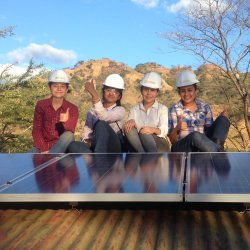It takes two hours on foot, up a long dirt path, to reach the community of El Guayo, Nicaragua from the main road, following a three-hour bus-ride from the capital, Managua. Nearly 100 children live in the community, studying each day under three teachers in a tiny school that, like the rest of the community, has gone dark at sunset since the day it was built. Their parents work in the fields, growing beans, corn, wheat and cattle to feed their families, and looking for every opportunity to bring more economic stability to the village.
In January, an opportunity came. Nine Nicaraguan women, a combination of engineering students and women working in energy, joined GRID Alternatives and community members to install solar power on the community’s school. The women were participating in GRID’s first Mujeres del Sol project, an all-Nicaraguan, all-women installation event to both educate and inspire local women in the energy field, and bring power to a community yearning for access to more education and opportunities for themselves and their children.
“My primary motivation [to apply for Mujeres del Sol] was knowing that by giving just a little bit of my knowledge would help a whole community, not only the kids who attend the school,” said Harenia del Carmen Maldonado Ubeda, a participant. “Perhaps one day those kids would become engineers in renewable energy.”
The trip was inspired by GRID Alternatives’ National Women in Solar Initiative here in the U.S., a partnership with SunEdison to bring more women into the solar industry and support their professional growth. The nine women, selected from nearly 100 applicants, were able to participate at no cost thanks in part to funds raised at our Play For Power Softball Tournament in Oakland, California.
“With this project, I learned new skills in installation, new skills on teamwork, communication, and everyday living, as well putting my knowledge into practice,” said Scarleth Vasconcelos, another participant.
“In a developing country like Nicaragua, we still live in a patriarchal society where women have to work hard to have a space to follow their dreams,” says Carla Estrada, Field Project Manager for GRID Alternatives in Nicaragua. “This initiative gave nine women the opportunity to practice their skills and make a difference.”
Now that the 1400 watt system and LED lighting has been installed, adults in El Guaylo will begin receiving literacy classes in the afternoon, improving their economic opportunities, and the Ministry of Education has agreed to provide a computer and educational videos. Children will also be able to study in the evenings, and the school can be used for recreation and community meetings, improving life for everyone in the village.
“Thank you GRID Alternatives for this valuable opportunity to work side by side with others and for supporting rural communities,” said Maria Mercedes Alvarez, a social worker who participated. “I learned so much from living and working in the community.”
Click here for photos of the installation.

